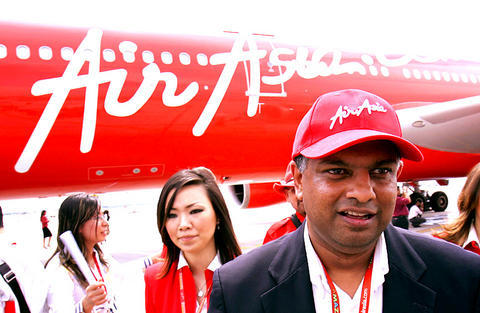Malaysia's long-haul budget carrier AirAsia X said yesterday that it will launch inaugural flights to China and Australia next month with the arrival of its first A330 aircraft.
It also unveiled plans to purchase 20 long-haul aircraft from either Boeing or Airbus to service future routes to Europe.
"We are excited with the arrival of the A330-300 aircraft. We plan to fly to China and Australia late October," AirAsia X chief executive officer Azran Osman-Rani said.

PHOTO: AP
"The plane will alternate between China and Australia. We plan to have at least five flights to China a week and four a week to Australia's Gold Coast," he said.
Azran said landing rights to both destinations had been secured and the airline was now waiting for Malaysian regulators to certify the plane.
The ambitious budget carrier, which has ordered 15 new Airbus A330 aircraft for medium-haul routes, due to begin delivery from next September, also plans to acquire another two leased A340s in the middle of next year.
"This will allow us to fly to London or Manchester, whichever airport imposes lower airport charges," Azran said.
AirAsia X routes will eventually extend to China, Europe, Japan and the Middle East, with fares on average 50 percent lower than full-service carriers, he said.
The airline's founder, Tony Fernandes, said AirAsia X is also eyeing the purchase of some 20 Boeing 787s, or Airbus 350s -- which are still on the drawing board -- for its long-haul routes.
"787 is real. I'm going to Seattle to talk with the Boeing CEO next week," he told reporters.
"Sure, we would be foolish not to talk to Boeing. But the 350 is an obvious choice. The Airbus has an advantage but the question is, when can we get the planes," he said.
In related news, US aircraft maker Boeing said yesterday that China, the world's fastest growing aviation market, will need 3,400 new airplanes worth about US$340 billion over the next 20 years.
The forecast marks a dramatic increase from an earlier prediction by Boeing of 2,900 aircraft in the period from 2005 to 2025.
Strong growth in both passenger and cargo transport will nearly quadruple China's fleet to 4,460 planes by the end of 2026, making it the largest market outside the US for new commercial aircraft, it said.
Following the anticipated surge in passenger traffic for next year's Beijing Olympic Games, China's domestic market will grow nearly five-fold by 2026 to become slightly larger than today's intra-North American market, it said.
Air travel growth between China and North America as well as between China and Europe will more than double in size during the next 20 years, the company said in a statement.

CHIP WAR: The new restrictions are expected to cut off China’s access to Taiwan’s technologies, materials and equipment essential to building AI semiconductors Taiwan has blacklisted Huawei Technologies Co (華為) and Semiconductor Manufacturing International Corp (SMIC, 中芯), dealing another major blow to the two companies spearheading China’s efforts to develop cutting-edge artificial intelligence (AI) chip technologies. The Ministry of Economic Affairs’ International Trade Administration has included Huawei, SMIC and several of their subsidiaries in an update of its so-called strategic high-tech commodities entity list, the latest version on its Web site showed on Saturday. It did not publicly announce the change. Other entities on the list include organizations such as the Taliban and al-Qaeda, as well as companies in China, Iran and elsewhere. Local companies need

CRITICISM: It is generally accepted that the Straits Forum is a CCP ‘united front’ platform, and anyone attending should maintain Taiwan’s dignity, the council said The Mainland Affairs Council (MAC) yesterday said it deeply regrets that former president Ma Ying-jeou (馬英九) echoed the Chinese Communist Party’s (CCP) “one China” principle and “united front” tactics by telling the Straits Forum that Taiwanese yearn for both sides of the Taiwan Strait to move toward “peace” and “integration.” The 17th annual Straits Forum yesterday opened in Xiamen, China, and while the Chinese Nationalist Party’s (KMT) local government heads were absent for the first time in 17 years, Ma attended the forum as “former KMT chairperson” and met with Chinese People’s Political Consultative Conference Chairman Wang Huning (王滬寧). Wang

CROSS-STRAIT: The MAC said it barred the Chinese officials from attending an event, because they failed to provide guarantees that Taiwan would be treated with respect The Mainland Affairs Council (MAC) on Friday night defended its decision to bar Chinese officials and tourism representatives from attending a tourism event in Taipei next month, citing the unsafe conditions for Taiwanese in China. The Taipei International Summer Travel Expo, organized by the Taiwan Tourism Exchange Association, is to run from July 18 to 21. China’s Taiwan Affairs Office spokeswoman Zhu Fenglian (朱鳳蓮) on Friday said that representatives from China’s travel industry were excluded from the expo. The Democratic Progressive Party government is obstructing cross-strait tourism exchange in a vain attempt to ignore the mainstream support for peaceful development

DEFENSE: The US would assist Taiwan in developing a new command and control system, and it would be based on the US-made Link-22, a senior official said The Ministry of National Defense is to propose a special budget to replace the military’s currently fielded command and control system, bolster defensive resilience and acquire more attack drones, a senior defense official said yesterday. The budget would be presented to the legislature in August, the source said on condition of anonymity. Taiwan’s decade-old Syun An (迅安, “Swift Security”) command and control system is a derivative of Lockheed Martin’s Link-16 developed under Washington’s auspices, they said. The Syun An system is difficult to operate, increasingly obsolete and has unresolved problems related to integrating disparate tactical data across the three branches of the military,